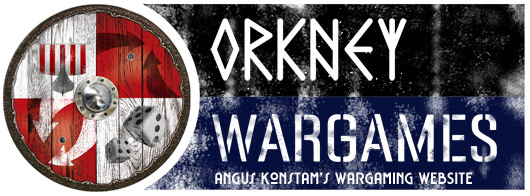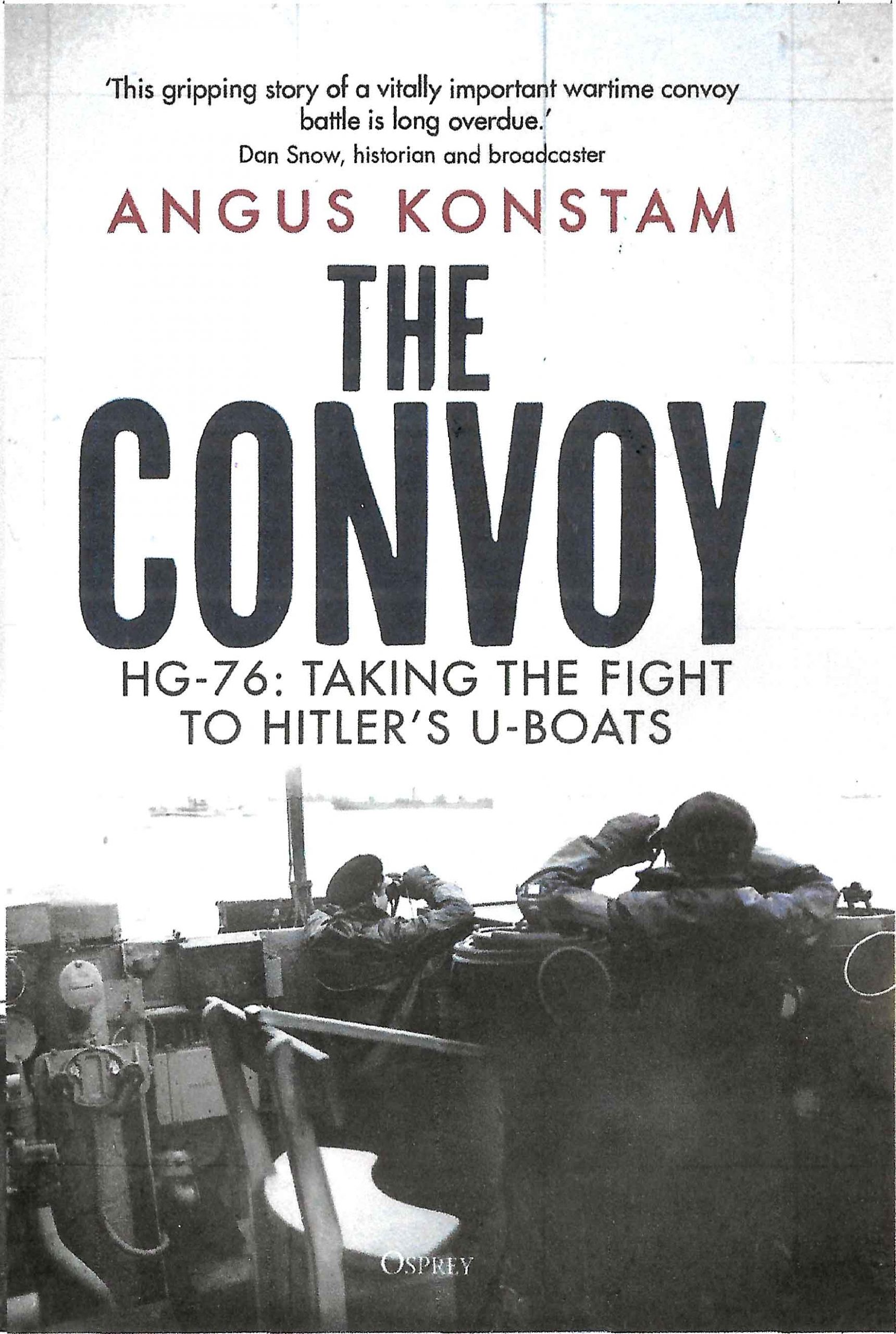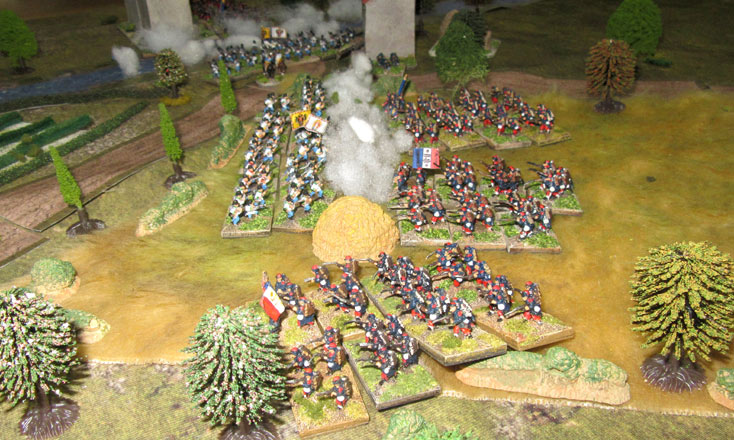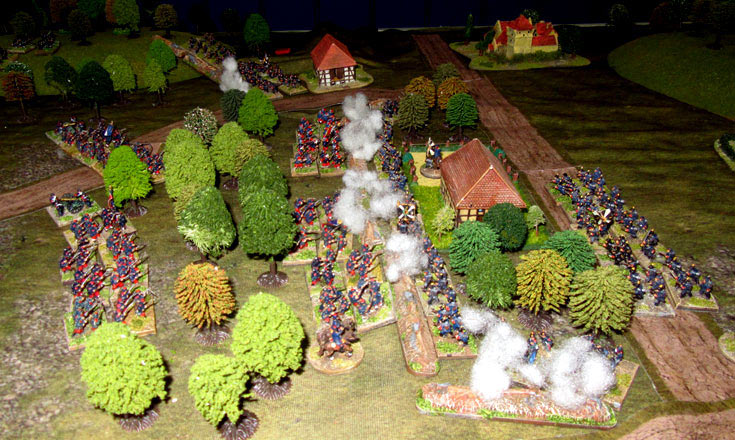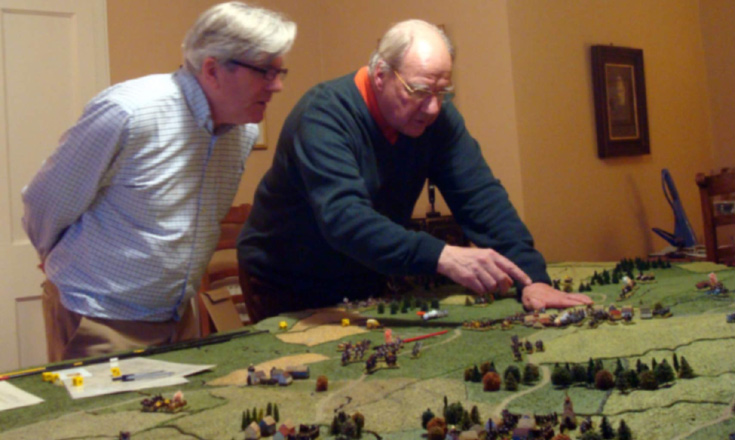
The Battle of Nachod, 1866
18th December 2012, 0 Comments
Bismarck’s Wars, Field of Battle, 10mm
Once again I found myself at Gerry Henry’s place, fighting over the same little patch of Bohemia as before. After four visits to it the delights of the village of Wenzelsberg are fading slightly. Fortunately, this time I was joined by Colin Jack, who joined me on the Prussian side, and Charles S. Grant, who sided with Gerry, who also acted as the pro-Austrian umpire. Colin was duly given command of the troops defending the village, while I took charge of the Prussian division to their right, deployed outside the long straggling village of Wysokow. It lay on the road to Nachod, somewhere behind us off the table. That was where the bulk of the Prussian army were, marching through the Nachod defile towards the battlefield. The Austrians were trying to throw our advanced guard off the ridge covering the exit from the defile. If they captured the two villages, then the Prussians would find themselves bottled up, and in a serious pickle. As Charles (a retired brigadier) was playing the part of General Raming, commander of the Austrian VI Corps, we knew he’d be doing all he could to eject us from our precarious position. As before, the battle began with an Austrian attack on Wenzelsberg. This landed up being just as successful as our previous attacks. While the Austrian guns were able to cause heavy casualties to the Prussian infantry grouped around the village, Colin Jack was able to bring up his second brigade to support them. It deployed along the road lining the Wenzelsberg Hill, above the village, and when the Austrians launched their attack they were shot to pieces. A second attack through a small copse to reach the village from the west also ended in disaster. Soon all of Gerry’s infantry were either routing, reforming or dead.
As before, the battle began with an Austrian attack on Wenzelsberg. This landed up being just as successful as our previous attacks. While the Austrian guns were able to cause heavy casualties to the Prussian infantry grouped around the village, Colin Jack was able to bring up his second brigade to support them. It deployed along the road lining the Wenzelsberg Hill, above the village, and when the Austrians launched their attack they were shot to pieces. A second attack through a small copse to reach the village from the west also ended in disaster. Soon all of Gerry’s infantry were either routing, reforming or dead. That left Charles’ attack on Wysokow. Thanks to some opportune movement cards the Austrians managed to beat the Prussians into reach the village, occupying it with a battalion of jaegers and two battalions of line infantry. A second brigade also attacked on the right of the Austrians there, pinning the Prussian regiment in front of it, and generally forming themselves up for “a big push”. Over on the Austrian left a division of cuirassiers emerged from the woods, and advanced against the Prussian light cavalry which was screening the slopes of the hill north of Wyskow. When the cuirassiers charged they sent the Prussians packing, but then had to pause to reform. Taking advantage of their own string of movement cards the Prussians rallied and counter-attacked, and working together the Prussian dragoons and hussars managed to repulse and break the first Austrian cuirassier regiment. That in turn allowed them to extricate their horse-artillery battery, which at one point had retired, only to find its own cavalry routing past them, with the Austrians in pursuit! In the end the Prussians still held their ground, but the Austrians were sorting themselves out, bringing p reinforcements, and generally looking to renew the cavalry melee with superior numbers. Fortunately for me the game ended before Charles could launch his second charge.
That left Charles’ attack on Wysokow. Thanks to some opportune movement cards the Austrians managed to beat the Prussians into reach the village, occupying it with a battalion of jaegers and two battalions of line infantry. A second brigade also attacked on the right of the Austrians there, pinning the Prussian regiment in front of it, and generally forming themselves up for “a big push”. Over on the Austrian left a division of cuirassiers emerged from the woods, and advanced against the Prussian light cavalry which was screening the slopes of the hill north of Wyskow. When the cuirassiers charged they sent the Prussians packing, but then had to pause to reform. Taking advantage of their own string of movement cards the Prussians rallied and counter-attacked, and working together the Prussian dragoons and hussars managed to repulse and break the first Austrian cuirassier regiment. That in turn allowed them to extricate their horse-artillery battery, which at one point had retired, only to find its own cavalry routing past them, with the Austrians in pursuit! In the end the Prussians still held their ground, but the Austrians were sorting themselves out, bringing p reinforcements, and generally looking to renew the cavalry melee with superior numbers. Fortunately for me the game ended before Charles could launch his second charge. The same run of Prussian movement cards gave me a chance to launch a counter-attack against the Austrians ensconced in Wyskow. We went in (above right) with bayonets fixed, after delivering a pretty impressive volley which disordered the defenders. The jaegers were chopped up, and the survivors fled, but the Austrian line were made of sterner stuff, and held their positions in the southern part of the village. That meant that by the time the game drew to a close the Austrians held one half of Wyskow, and the Prussians the other half. In the photo down below, Gerry (left) and Charles are shown pondering over what to do next.
The same run of Prussian movement cards gave me a chance to launch a counter-attack against the Austrians ensconced in Wyskow. We went in (above right) with bayonets fixed, after delivering a pretty impressive volley which disordered the defenders. The jaegers were chopped up, and the survivors fled, but the Austrian line were made of sterner stuff, and held their positions in the southern part of the village. That meant that by the time the game drew to a close the Austrians held one half of Wyskow, and the Prussians the other half. In the photo down below, Gerry (left) and Charles are shown pondering over what to do next.
 Meanwhile, over to the south-west the Austrians launched their “big push”. Six “storm battalions” went in, supported by jaegers, guns and cavalry. The defending regiment of Prussian infantry did what it could, but only managed to stop the jaegers and two battalions. The rest piled into the melee, and the Prussians were sent tumbling back. It could have been worse – fortunately I had a battalion in reserve, and the routers rallied behind it, while the reserve battalion shredded the closest battalion of Austrian line. At that stage – fortunately – the game ended, as we’d run out of time. While GErry’s attack had foundered (again), Charles had made a more professional job of it around Wyskow, and the Prussians there – while still holding on – were clearly under a lot of pressure. The game could have gone either way, but time was against us. After taking pictures to let us pick things up where we left off we called it a day. Rather selfishly, Gerry’s family demanded the use of the dining room for Christmas, which meant everything had to be packed away. Still, no doubt we’ll be fighting over the same ruddly little Bohemian villages some time in the New Year.
Meanwhile, over to the south-west the Austrians launched their “big push”. Six “storm battalions” went in, supported by jaegers, guns and cavalry. The defending regiment of Prussian infantry did what it could, but only managed to stop the jaegers and two battalions. The rest piled into the melee, and the Prussians were sent tumbling back. It could have been worse – fortunately I had a battalion in reserve, and the routers rallied behind it, while the reserve battalion shredded the closest battalion of Austrian line. At that stage – fortunately – the game ended, as we’d run out of time. While GErry’s attack had foundered (again), Charles had made a more professional job of it around Wyskow, and the Prussians there – while still holding on – were clearly under a lot of pressure. The game could have gone either way, but time was against us. After taking pictures to let us pick things up where we left off we called it a day. Rather selfishly, Gerry’s family demanded the use of the dining room for Christmas, which meant everything had to be packed away. Still, no doubt we’ll be fighting over the same ruddly little Bohemian villages some time in the New Year.
